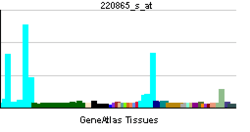PDSS1
| Prenyl (decaprenyl) diphosphate synthase, subunit 1 | |||||||||||||
|---|---|---|---|---|---|---|---|---|---|---|---|---|---|
| Identifiers | |||||||||||||
| Symbols | PDSS1 ; COQ1; COQ10D2; DPS; SPS; TPRT; TPT; TPT 1; hDPS1 | ||||||||||||
| External IDs | OMIM: 607429 MGI: 1889278 HomoloGene: 5353 GeneCards: PDSS1 Gene | ||||||||||||
| EC number | 2.5.1.91 | ||||||||||||
| |||||||||||||
| RNA expression pattern | |||||||||||||
 | |||||||||||||
| More reference expression data | |||||||||||||
| Orthologs | |||||||||||||
| Species | Human | Mouse | |||||||||||
| Entrez | 23590 | 56075 | |||||||||||
| Ensembl | ENSG00000182347 | ENSMUSG00000026784 | |||||||||||
| UniProt | Q5T2R2 | Q33DR2 | |||||||||||
| RefSeq (mRNA) | NM_014317 | NM_019501 | |||||||||||
| RefSeq (protein) | NP_055132 | NP_062374 | |||||||||||
| Location (UCSC) | Chr 10: 26.7 – 26.75 Mb | Chr 2: 22.9 – 22.94 Mb | |||||||||||
| PubMed search | |||||||||||||
Decaprenyl-diphosphate synthase subunit 1 is an enzyme that in humans is encoded by the PDSS1 gene.[1][2]
The protein encoded by this gene is an enzyme that elongates the prenyl side-chain of coenzyme Q, or ubiquinone, one of the key elements in the respiratory chain. The gene product catalyzes the formation of all trans-polyprenyl pyrophosphates from isopentyl diphosphate in the assembly of polyisoprenoid side chains, the first step in coenzyme Q biosynthesis. The protein may be peripherally associated with the inner mitochondrial membrane, though no transit peptide has been definitively identified to date.[2]
References
- ↑ Rotig A, Appelkvist EL, Geromel V, Chretien D, Kadhom N, Edery P, Lebideau M, Dallner G, Munnich A, Ernster L, Rustin P (Sep 2000). "Quinone-responsive multiple respiratory-chain dysfunction due to widespread coenzyme Q10 deficiency". Lancet 356 (9227): 391–395. doi:10.1016/S0140-6736(00)02531-9. PMID 10972372.
- ↑ 2.0 2.1 "Entrez Gene: PDSS1 prenyl (decaprenyl) diphosphate synthase, subunit 1".
Further reading
- Appelkvist EL; Aberg F; Guan Z et al. (1995). "Regulation of coenzyme Q biosynthesis". Mol. Aspects Med. 15 Suppl: s37–46. doi:10.1016/0098-2997(94)90011-6. PMID 7752843.
- Runquist M; Ericsson J; Thelin A et al. (1994). "Isoprenoid biosynthesis in rat liver mitochondria. Studies on farnesyl pyrophosphate synthase and trans-prenyltransferase". J. Biol. Chem. 269 (8): 5804–9. PMID 8119922.
- Maruyama K, Sugano S (1994). "Oligo-capping: a simple method to replace the cap structure of eukaryotic mRNAs with oligoribonucleotides". Gene 138 (1–2): 171–174. doi:10.1016/0378-1119(94)90802-8. PMID 8125298.
- Teclebrhan H, Olsson J, Swiezewska E, Dallner G (1993). "Biosynthesis of the side chain of ubiquinone:trans-prenyltransferase in rat liver microsomes". J. Biol. Chem. 268 (31): 23081–6. PMID 8226825.
- Suzuki Y; Yoshitomo-Nakagawa K; Maruyama K et al. (1997). "Construction and characterization of a full length-enriched and a 5'-end-enriched cDNA library". Gene 200 (1–2): 149–156. doi:10.1016/S0378-1119(97)00411-3. PMID 9373149.
- Strausberg RL; Feingold EA; Grouse LH et al. (2003). "Generation and initial analysis of more than 15,000 full-length human and mouse cDNA sequences". Proc. Natl. Acad. Sci. U.S.A. 99 (26): 16899–16903. doi:10.1073/pnas.242603899. PMC 139241. PMID 12477932.
- Deloukas P; Earthrowl ME; Grafham DV et al. (2004). "The DNA sequence and comparative analysis of human chromosome 10". Nature 429 (6990): 375–381. doi:10.1038/nature02462. PMID 15164054.
- Gerhard DS; Wagner L; Feingold EA et al. (2004). "The status, quality, and expansion of the NIH full-length cDNA project: the Mammalian Gene Collection (MGC)". Genome Res. 14 (10B): 2121–2127. doi:10.1101/gr.2596504. PMC 528928. PMID 15489334.
- Saiki R; Nagata A; Kainou T et al. (2005). "Characterization of solanesyl and decaprenyl diphosphate synthases in mice and humans". FEBS J. 272 (21): 5606–5622. doi:10.1111/j.1742-4658.2005.04956.x. PMID 16262699.
- Mollet J; Giurgea I; Schlemmer D et al. (2007). "Prenyldiphosphate synthase, subunit 1 (PDSS1) and OH-benzoate polyprenyltransferase (COQ2) mutations in ubiquinone deficiency and oxidative phosphorylation disorders". J. Clin. Invest. 117 (3): 765–772. doi:10.1172/JCI29089. PMC 1804361. PMID 17332895.
| ||||||||||||||||||||||||||||||||||||||||||||||||||||